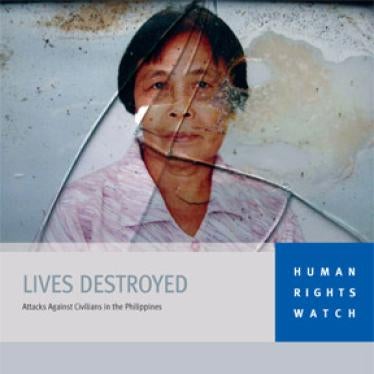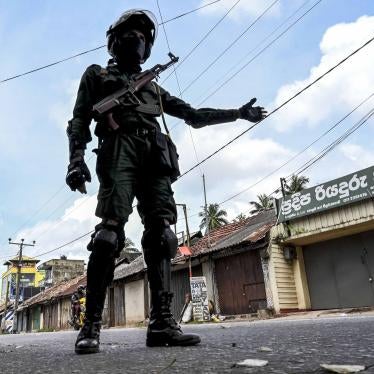(New York) - Violent Islamist groups in the Philippines have killed or injured more than 1,700 people in bombings and other attacks since 2000, Human Rights Watch said in a new report and photo essay released today. The attacks, mostly in Mindanao, Basilan, Jolo, and other southern islands, have also included kidnappings, executions, and shootings.
The 28-page report,“Lives Destroyed: Attacks on Civilians in the Philippines,” contains personal accounts and photographs of bombing sites and of victims of attacks and their relatives. It describes how attacks have killed children, parents, husbands, and wives, and caused terrible suffering among wounded survivors and relatives. The Abu Sayyaf Group (ASG) and the Rajah Solaiman Movement (RSM), based in the southern Philippines, are implicated in or have claimed responsibility for many of the attacks.
“Extremist armed groups have spread terror among civilians in the Philippines,” said John Sifton, senior researcher on terrorism and counterterrorism at Human Rights Watch. “They have bombed buses carrying workers, food markets where people were shopping, airports where relatives were waiting for loved ones, and ferry boats carrying families.”
The casualties since 2000 amount to more than the number of people killed and injured in bombing attacks during the same period in neighboring Indonesia (including the 2002 Bali bombings), and considerably more than the number of those killed and injured in bombings in Morocco, Spain, Turkey, or the United Kingdom. The scale of the violence, however, has not received widespread attention outside the region.
Human Rights Watch faulted the Philippines government for not prosecuting those responsible for attacks. Although numerous suspects in bombing attacks have been arrested since 2000, Human Rights Watch said that very few have been successfully brought to trial, and prosecutions in some cases have been delayed for more than four years.
Human Rights Watch has criticized the recent passage of a new counterterrorism law, "The Human Security Act," which contains dangerous overbroad provisions that violate human rights standards and broaden the scope of government power to hold terrorism suspects indefinitely. Human Rights Watch said that existing criminal statutes were more than sufficient to prosecute acts of terrorism.
“The Philippines doesn’t need a new abusive counterterrorism law,” said Sifton. “The government isn’t using the laws it already has, so why does it need new provisions that violate human rights?”
The Human Rights Watch report provides compelling new information about many of the attacks that have occurred in recent years. For instance, it contains interviews with survivors of the February 27, 2004 bombing of the Superferry 14, a ferry traveling from Manila to Mindanao. The bomb, which detonated just outside of Manila harbor, killed at least 116 people. The dead included 15 children, six of whom were under five years old. At least 12 families lost multiple members, and at least 10 married couples died together. Six of the children killed in the blast were students on a championship team sent by schools in northern Mindanao to compete in a journalism contest in Manila.
The report also details the February 14, 2005 “Valentine’s Day” bombings of Manila and two cities in Mindanao. Human Rights Watch interviewed Mark Gil Bigbig, a 31-year-old student, who was eating at a fast-food restaurant in General Santos City when a bomb went off outside: “We were surprised . . . people were shouting, ‘It’s a bomb!’ I looked down, and already I could see my blood splashing below me, and I dropped to the ground.” Bigbig suffered major trauma to his legs from shrapnel and broken glass, and today, more than two years after the attack, cannot walk without braces and crutches.
The report explains how survivors with minimal physical injuries have suffered. For instance, Aurelia Espera, a victim of a 2003 attack, tearfully told Human Rights Watch about seeing the bodies of her two children, one of them decapitated, and her mother-in-law: “I can never forget, I saw my children lying there in the street.”
Members of the ASG and RSM are implicated in or have claimed responsibility for many of these attacks. ASG is an extremist Islamist group whose members broke away in the 1990s from the longstanding ethnic Moro insurgent groups based in the predominantly Muslim areas of the southern Philippines (“Moro” is a Philippine term for Muslim). RSM, a group composed of converts to Islam, is closely tied to ASG. The two groups purportedly aim to push Christians out from Mindanao and the Sulu islands and “restore” Islamic rule over the Philippines.
“Abu Sayyaf and Rajah Solaiman have committed crimes on a massive scale,” said Sifton. “They have intentionally bombed civilians, kidnapped ordinary workers and beheaded them, and extorted money from small businesses.”
Both ASG and RSM maintain links with current or former members of Jemaah Islamiyah (JI), the violent Indonesian Islamist group responsible for the 2002 Bali bombings. Philippine government officials claim that elements of the longstanding Moro Islamic Liberation Front (MILF) and Moro National Liberation Front (MNLF) have, over the last few years, provided sanctuary or assistance for ASG, RSM and JI members.
Since 2003, MILF and MNLF leaders appear to have largely cut ties with JI, condemned violence against civilians (and specifically ASG and RSM attacks), and provided active assistance to Philippine military forces in conducting operations against all three groups. The United States military is actively assisting in these operations.
Human Rights Watch said today that it remains likely that “rogue” MILF and MNLF commanders, and so-called “lost commands,” have continued to provide sanctuary and assistance to ASG, RSM and JI members at various times in the last several years.
Human Rights Watch urged the MILF and MNLF to continue condemning armed attacks on civilians by ASG, RSM and JI, and to continue working with authorities to apprehend those responsible for violent attacks.
“Moro leaders deserve credit for distancing themselves from armed groups that attack civilians,” said Sifton. “But they need to ensure that they are controlling their own members.”
Human Rights Watch said today that the government’s failure to prosecute suspects in attacks has contributed to a culture of conspiracy-theorizing in the Philippines, especially in the south. Skeptical Moro and other opposition political leaders have embraced allegations that the government itself has been responsible for bombings – claims which Human Rights Watch has seen no evidence to support. Human Rights Watch called on the Philippine Department of Justice to put prosecutions back on track and hold fair and public trials.
Human Rights Watch also called on the United States and other interested countries to provide assistance to ongoing peace negotiations between the Philippines government and Moro leaders, to help ensure that agreements between the Philippine government and MILF and MNLF are enduring and promote respect for human rights, including the protection of the civilian population.
“To end the bombings, kidnappings, and other violence, other governments have to pressure Philippine leaders – both in Manila and Mindanao – to put a greater emphasis on protecting civilian life,” Sifton said.







